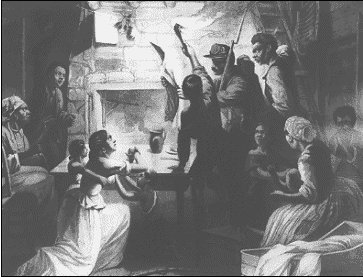Tennessee Commentary
companion video - Dr. Reavis L. Mitchell Jr., Fisk University professor and Tennessee Historical Commission chair
companion photos
40 Acres and a Mule & The Civil War
The history of the United States is a dramatic story of the good, the bad, and the ugly. Some Historians, however, have rewritten the play and edited out many scenes that highlight the good, the bad, and the ugly in all of us.
 President Abraham Lincoln (NARA, 64-M-163)
President Abraham Lincoln (NARA, 64-M-163)
President Abraham Lincoln had, by far one of the more challenged presidency in the history of the United States. He had the courage and responsibility of bringing the States together.
We are taught in school that his signing of the Emancipation Proclamation of 1863 freed the African American from the institution of slavery. Furthermore, the Civil War itself, a time when, according to Dr. Mitchell of Fisk University, "more Americans died than in the American Revolution, the war of 1812, the Spanish American War, World War I, World War II, the Korean Conflict, and the 1st half of the Viet Nam War", all put together, was fought for the emancipation of African People. Did our textbooks do us justice?
In fact, the cause of the Civil War was not the freedom of African Americans but rather the Economic and Political disparity that existed between an industrialized North and an agricultural South. Freedom for the African American was an outcome not the cause of the Civil War. While Slavery existed in both the North and the South, Abraham Lincoln’s edict to the Southern states that left the union prior to the Civil War, was that they (the Southern States) must return to the union by a certain date or their slaves would be set free. Nothing was mentioned about the slaves in the Northern States.
 A Union soldier reads the Emancipation Proclamation to newly freed slaves. After Lincoln signed the Proclamation, celebrations took place throughout the country. (NARA, 79-CWC-3F8)
A Union soldier reads the Emancipation Proclamation to newly freed slaves. After Lincoln signed the Proclamation, celebrations took place throughout the country. (NARA, 79-CWC-3F8)
The Union Army was loosing the war and more manpower was needed. For this reason, African Americans were offered freedom in return for their enlistment. In the Civil War, African Americans fought as gallantly as did their counterparts but it was the 13th, 14th, and 15th, amendments that actually gave African Americans their freedom.
According to historian Dr. Mitchell, the turning point of the Civil War came at the battle of Nashville, Tennessee. This battle was fought by the 369th regiment of African American soldiers. The 1989 movie, Glory, tells the story of an all African American regiment of Civil War soldiers who bravely fought and the majority died at the battle of Fort Wagner, in South Carolina. The regiment was reconstituted in Nashville where they withheld the charge of the Confederate Army and changed the direction of the war.
Despite the understanding that the Emancipation Proclamation did not free any slaves it became the celebrated day of liberation for some 50 years.
On January 1 in 1913, the New York Times published a poem written by James Weldon, a writer of some distinction, for the 50th anniversary of the Proclamation. Addressing his fellow African Americans in the second stanzas and with an assertive tone making certain that humility in his first stanza did not replace self-confidence, Johnson wrote:
This land is ours by right of birth, This land is ours by right of toil We helped to turn its virgin earth, Our sweat is in its fruitful soil.
To gain these fruits that have been earned, To hold these fields that have been won, Our arms have strained, our backs have burned, Bent bare beneath a ruthless sun.
Then should we speak but servile words, Or shall we hang our heads in shame? Stand back of new-come foreign hordes, And fear our heritage to claim?
No! stand erect and without fear, And for our foes let this suffice-- We've bought a rightful sonship here, And we have more than paid the price. . . .
That for which millions prayed and sighed That for which tens of thousands fought, For which so many freely died, God cannot let it come to naught.
Over 100,000 African American men and women fought in the Civil War. For more reading on this subject, the following NARA site features an article by John Hope Franklin. Celebrate the issuance of this landmark document in the Summer 1993 issue of Prologue Quarterly, vol. 25, no. 2.
http://www.archives.gov/publications/prologue/1993/summer/emancipation-proclamation.html
After a few days of viewing the above information, we will continue our ride into history. Also, for daily updates and podcast on the AMAAP journey visit NJ.com and type in "Where is Miles Dean" in the search box.
We invite you to add comments on the content of this web site on our blog. In addition, we will post commentaries during this ride from guest writers as we proceed across the country.
Images courtesy of: Library of Congress Lexington Herald-Leader